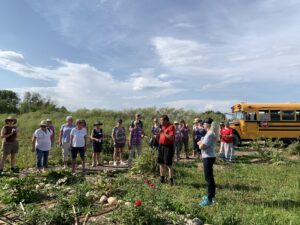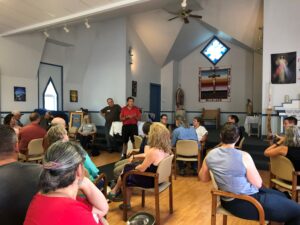Decolonizing Ourselves: Healing Haunted Histories

On August 27, 2022, Muskeg Lake Cree Nation hosted a group of 45 (mostly) settlers, reflecting on the theme of “Decolonizing Ourselves: Healing Haunted Histories.” The event’s title was drawn from the book by Elaine Enns and Ched Meyers, Healing Haunted Histories: A Settler Discipleship of Decolonization. The authors, plus former Chief and Catholic deacon Harry Lafond and his partner, Metis Elder Germaine Lafond, led us in reflecting on our landlines, bloodlines, and songlines in different locations around the Muskeg Lake reserve.
This was the second in-person event organized by the KAIROS “Decolonization Group,” a small collection of mostly Saskatchewan-based settlers interested in working towards decolonizing ourselves (and others like us), and our partners at the Treaty Land Sharing Network. In August 2021 we organized an event at Fort Carlton to reflect on “Land and the Spirit of Treaty,” which you can read about here.
This time, just across the North Saskatchewan River from Fort Carlton, we were challenged to think specifically about our personal and familial complicities in settler colonialism, and what this means for us today. To some extent this reflective journey began with the very act of traveling to Muskeg Lake: Harry Lafond pointed out that for many settlers, even coming onto reserve can be a big (uncomfortable?) step.
At the cultural camp location, while drinking cups of muskeg tea steeped over the fire, we reflected on landlines—how did we end up on this land, what pushed or pulled our ancestors here, and what privileges do we assume and accountabilities do we avoid?
Some of us were lucky enough to get to ride a school bus to our next location, the pow wow arbour. On the bus we were able to listen to Harry talk about his community’s history (including some of the injustices perpetrated by Canada), culture, and hopes for the future. We also had the privilege of being driven by former Chief Wallace Tawpisin (who was kind enough to share some of his own family’s stories of colonial wrongs, if you took the time to ask him).
At the pow wow arbour, we talked about bloodlines—what do we know (or perhaps more tellingly, not know) about our families’ migration? What traumas did they experience, and to what extent do we suffer from moral injury today due to harms our people (including us as individuals) have caused others?

Our final stop was the Our Lady of Guadalupe Catholic church, where Harry and Germaine minister to community members. Here, in small groups, we shared songlines—those liberative stories that inspire us to work for justice, including decolonization. And we asked ourselves, what concrete, restorative solidarity work might we do to further advance the decolonial project? After literally singing together, we joined in a meal of fried chicken, meatballs, potato salad, cucumber salad, green beans, and pie, before heading off on our separate ways into the Saskatchewan sunset (and a thunderstorm!).
For me, at least, I left not only with a (very) full stomach, but a heart full of gratitude for Muskeg Lake, for our teachers, and for my fellow participants, who had the courage to show up and engage in some serious, and seriously-overdue, work. Harry told us reconciliation would be one step closer when the day was done, which is a nice way to think about it. But there are, of course, many, many more steps to take.
Stay tuned on the KAIROS Prairies North Facebook page for future Decolonization Group events.
Javed Sommers lives on Treaty 6 territory in Edmonton, Alberta where he has worked with Treaty 6 First Nations for seven years. Javed is a member of First Presbyterian Church and is a graduate of the Faculty of Native Studies at the University of Alberta (Master of Arts). He is passionate about fighting colonialism in Canada and working towards mutually beneficial relations between settlers and Indigenous peoples.
